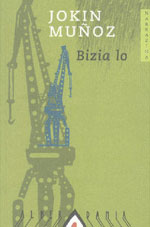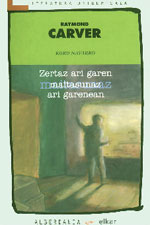
bizia lo
jokin muñoz · alberdania
Jokin Muñoz observes what's going on around him through threedimensional glasses. He then shows us these different dimensions. In the first dimension we see the defects of committed patriotism. Kromagnon with a kalashnikov in hand. He spends fifteen years in jail. The intellectual in the group, Bakunin, is a university professor. At the same university Kromagnon’s son goes to. By then Kromagnon had renounced his past and had left his wife. Ideological consciousness.
In the second dimension we see the incoherent ties created by family. The drug-dealer gives his fool brother amnesty stickers to wear. He spends his days throwing bricks at the cops just as those who wear the Che Guevara t-shirts shoot bullets. The drug-dealer is shot by a local operative cell. The differences between generations is present here too. Parents watch the news and fear they will hear their son's name mentioned in connection with bomb blasts going off. In the third dimension we come across deepness of feeling. Death. Parents sob, hidden away in the corner as their bedridden sickly child plays with a Meccano set. Life asleep. The above are just fragments we've chosen from this book of five short stories. At this time when audacity is so hard to find, all these stories are sharp and to the point with no excess flab. This book should be distributed as much as is possible. Giving it away with the newspaper is not too much of a step to take. It should be shown chapter by chapter on TV after Sin Chan or it should be made compulsory reading at secondary schools and universities.

zertaz ari garen maitasunaz ari garenean
raymond carver (itzul /trans) koro navarro · alberdania & elkar
Just as many proclaim the influence of Laboa in Basque music, so too do many writers when it comes to the influence of Raymond Carver on North-American writing. And while many also try to produce the same effect as caused by his work, very few (or nobody) can ever evoke such feelings of desperation. The simple Carver, the dirty Carver, the romantic Carver, the misty Carver, as fleeting as he is deep. He, more than anybody else, is capable of maintaining the sensation that anything can happen while nothing actually does. We heard the following from the translator of the book, Koro Navarro, in an interview she gave during the presentation of the book “The language and the story itself lean more towards complexity and wealth of expression; but Carver on the other hand, goes headlong against the rules of the story and language.” She also notes that “His writing is incredibly crafted and this affords great strength to the ideas and dialogues.” It's not as if Carver is new to us, but at least now we have the opportunity to read him in Basque.


